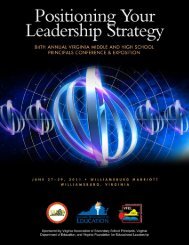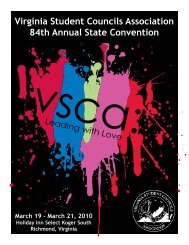2011 General Assembly Update - Virginia Association of Secondary ...
2011 General Assembly Update - Virginia Association of Secondary ...
2011 General Assembly Update - Virginia Association of Secondary ...
- No tags were found...
You also want an ePaper? Increase the reach of your titles
YUMPU automatically turns print PDFs into web optimized ePapers that Google loves.
Guidelines for the Prevention <strong>of</strong> Sexual Misconduct and AbuseThe <strong>Virginia</strong> Board <strong>of</strong> Education approved on March 24, <strong>2011</strong> the Guidelines for the Prevention<strong>of</strong> Sexual Misconduct and Abuse in <strong>Virginia</strong> Public Schools. The guidelines are designedto help school divisions create and implement policies and procedures that establish clearand reasonable boundaries for interactions among students and teachers, other schoolboard employees, and adult volunteers. The guidelines focus on school board responsibility;prevention; in-person communication and interactions; electronic communication; and reporting,training, and discipline. (Editor’s Note: Principals should be familiar with the state guidelineswhich can be accessed at: http://www.doe.virginia.gov/boe/guidance/safety/prevent_sexual_misconductabuse.pdf. School boards developing policies in this area will use this documentfor guidance. Even in the absence <strong>of</strong> a specific school board policy, the guidance documentis a valuable reference. It is possible that this document is the first <strong>of</strong> what is on the horizon.According to the July 19, <strong>2011</strong> issue <strong>of</strong> the National School Boards’ <strong>Association</strong> (NSBA) LegalClips, Missouri has enacted legislation relating to teacher’s online contact with students. Thelegislation requires school districts to develop policies by 2012 for communication betweenteachers and students that includes text messages, social networking websites, and otherelectronic devices. Those policies are to restrict teachers from interacting with students onwebsites or in ways that are not also accessible to others, including school administratorsand parents. It is important for principals to emphasize to teachers and staff the importance <strong>of</strong>communicating pr<strong>of</strong>essionally with students in all venues).Sheriff Assistance in Truancy MeetingsATTORNEY GENERAL OPINIONSThe Attorney <strong>General</strong> issued an opinion (Attorney <strong>General</strong> opinion 10-096) that a sheriff’s <strong>of</strong>ficeis permitted to assist a local school division with enforcing compulsory attendance laws byserving notice <strong>of</strong> an upcoming meeting to the parents or custodians <strong>of</strong> a truant student, providedthe local school board, division superintendent, or the administration <strong>of</strong> a particular school hasrequested such assistance from the sheriff. (Editor’s Note: This request for an opinion wasbased on a Hampton initiative to combat truancy. The initiative includes holding meetings withparents/guardians or truant students prior to filing criminal truancy charges or a child-in-need<strong>of</strong>-supervision(CHINS) petition. The Attorney <strong>General</strong>’s opinion, however, is very clear that thesheriff’s assistance is legal as long as it is requested by appropriate school division personnel).Fees for Advanced Placement CoursesThe Attorney <strong>General</strong> issued an opinion (Attorney <strong>General</strong> opinion 10-121) stating that a localschool board cannot impose a mandatory fee on students taking advanced placement (AP)courses for the required taking <strong>of</strong> the AP examination. (Editor’s Note: Fairfax County requiredstudents enrolled in advanced placement courses to take the advanced placement examinationas the end-<strong>of</strong>-course testing. According to the Attorney <strong>General</strong>’s opinion, Fairfax County wasnot within its rights to charge such fees since students enrolled in AP courses were requiredto take the AP examination as the end-<strong>of</strong>-course test. The opinion did not directly address theissue <strong>of</strong> payment <strong>of</strong> AP fees <strong>of</strong> students who are not required to take the AP exam in orderto receive credit for the course. Before deciding how to proceed with these students, schooldivision legal counsel should be consulted and school board policy should be addressed).A PUBLICATION OF THE VIRGINIA ASSOCIATION OF SECONDARY SCHOOL PRINCIPALS, INC.Copyright © <strong>2011</strong> by the <strong>Virginia</strong> <strong>Association</strong> <strong>of</strong> <strong>Secondary</strong> School Principals, Inc. All rights reserved.





